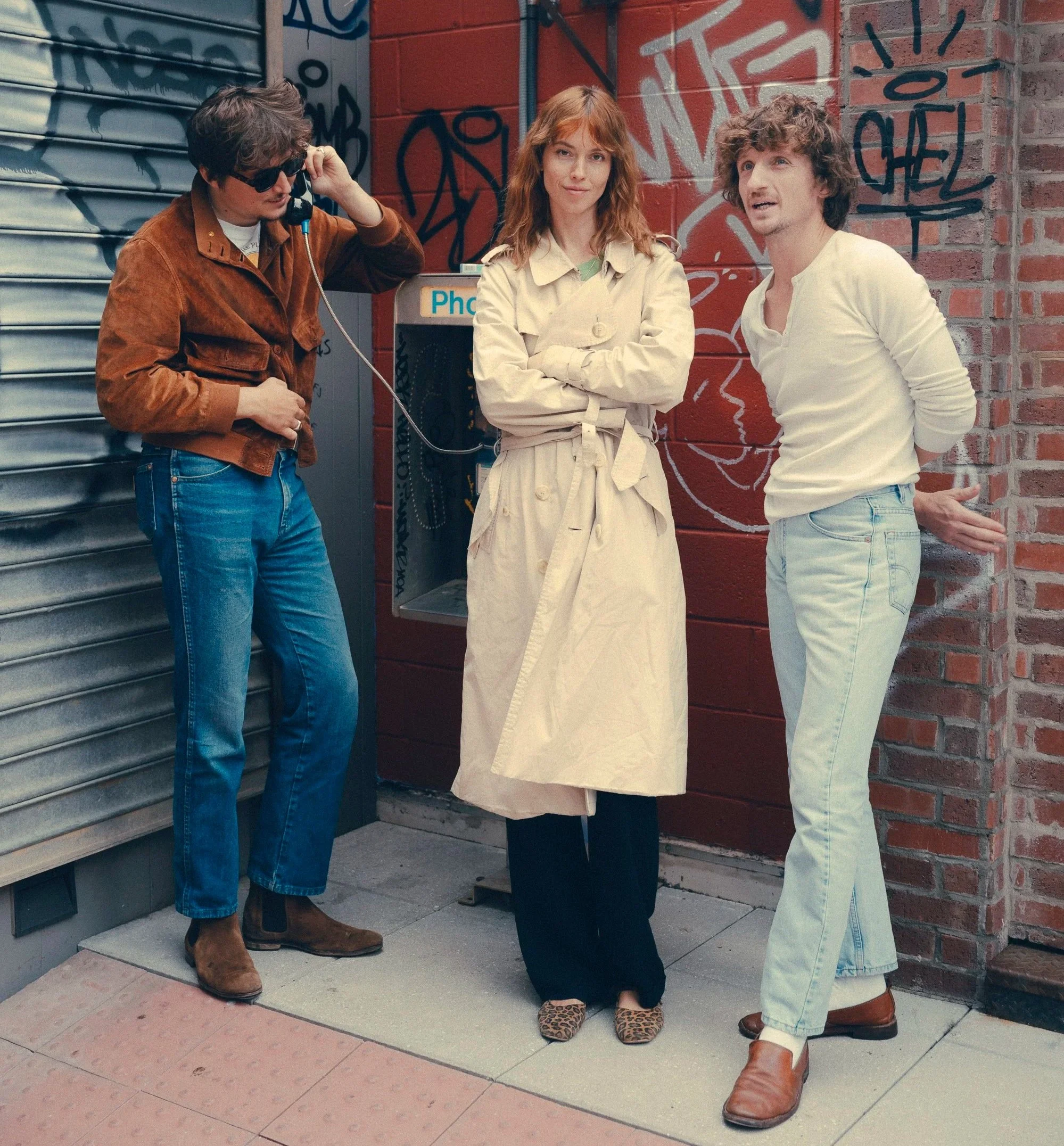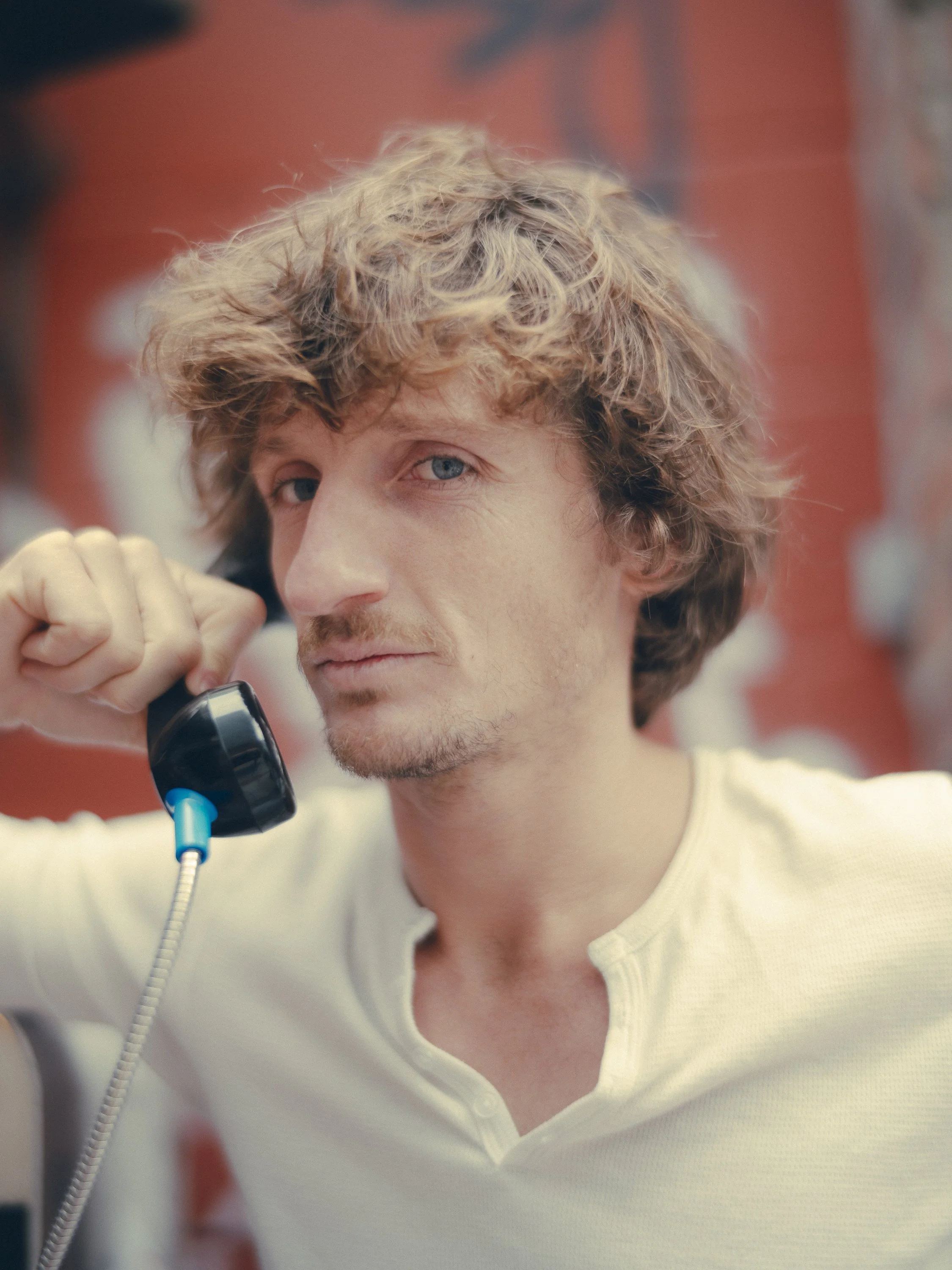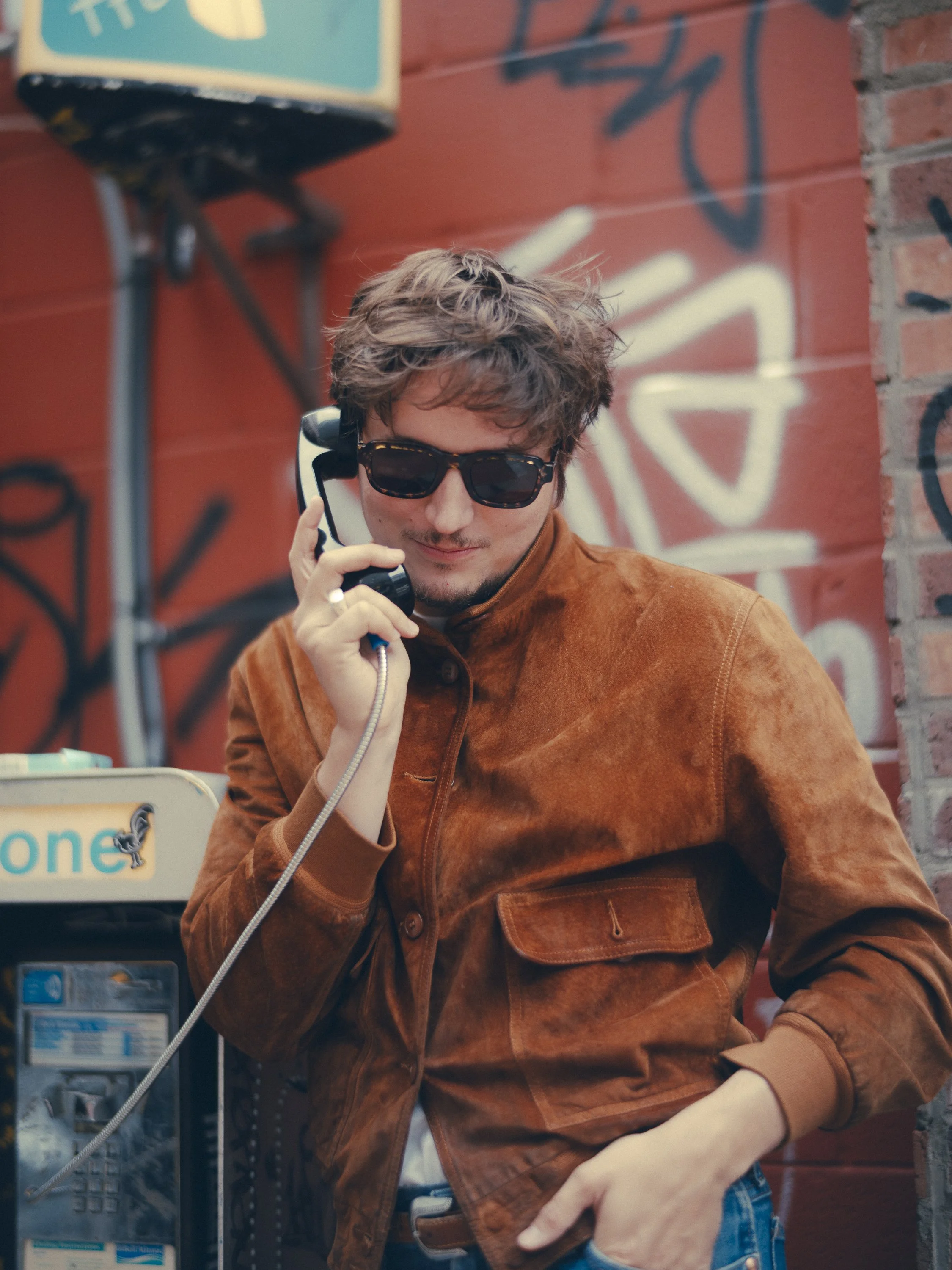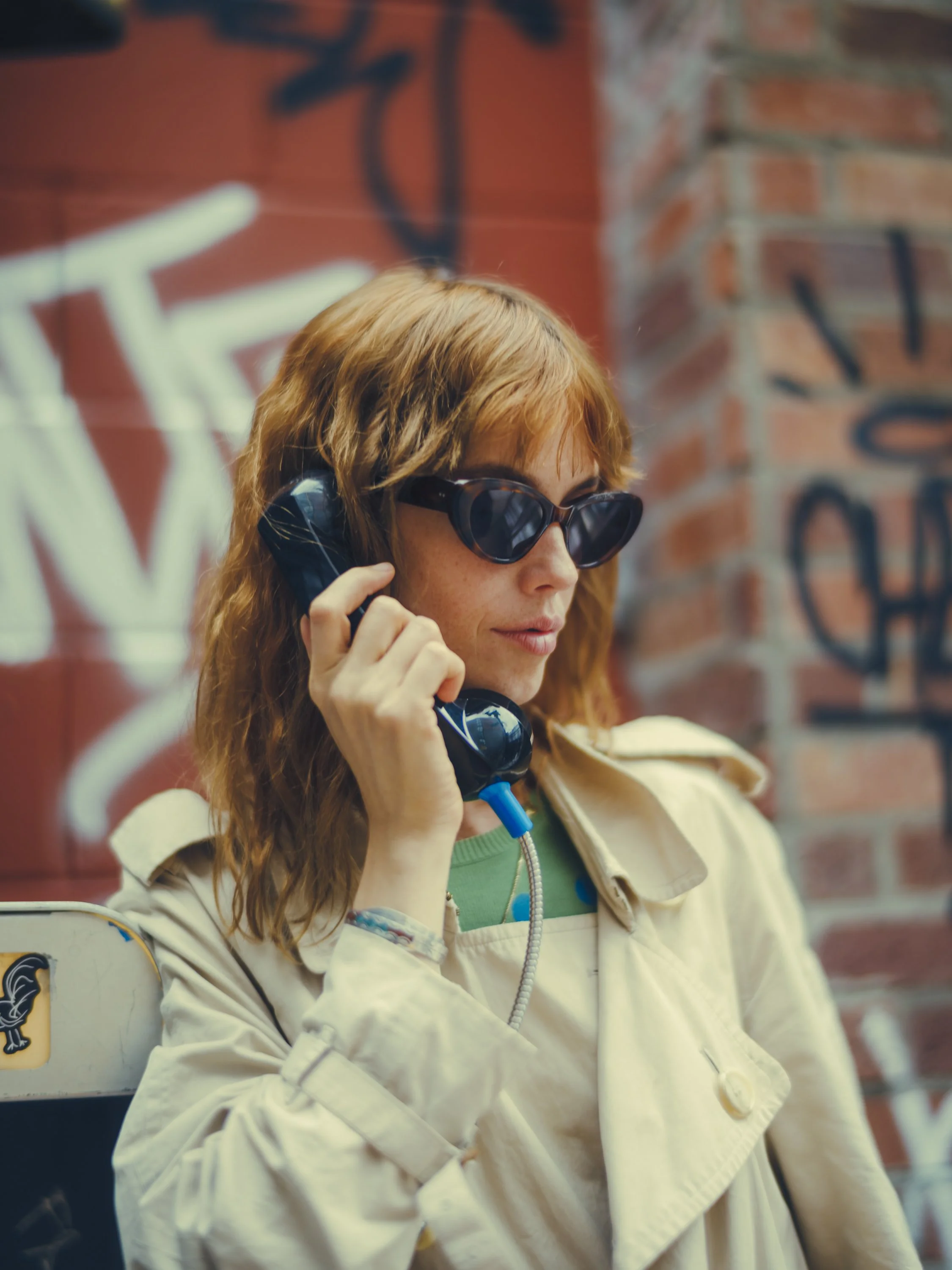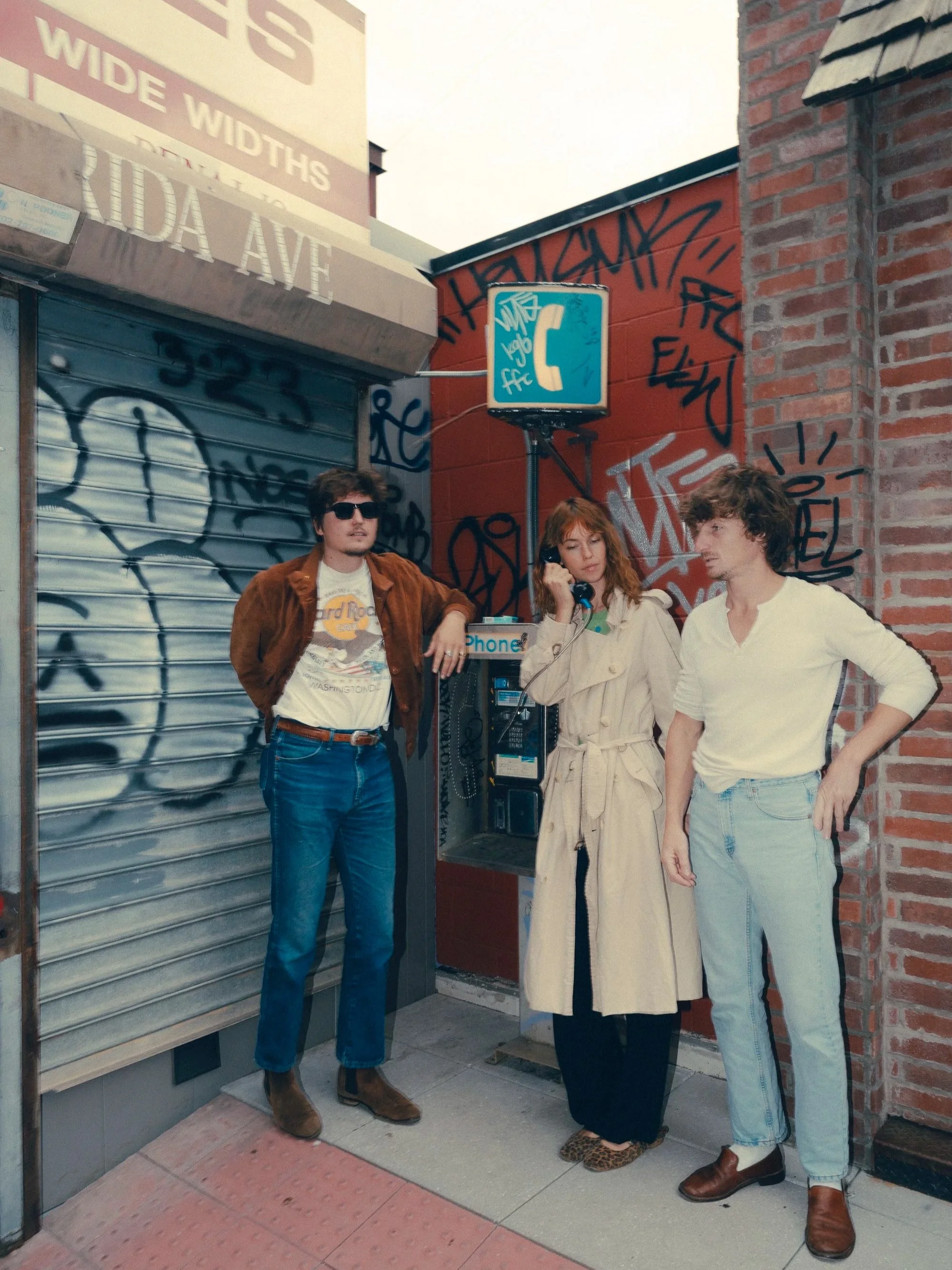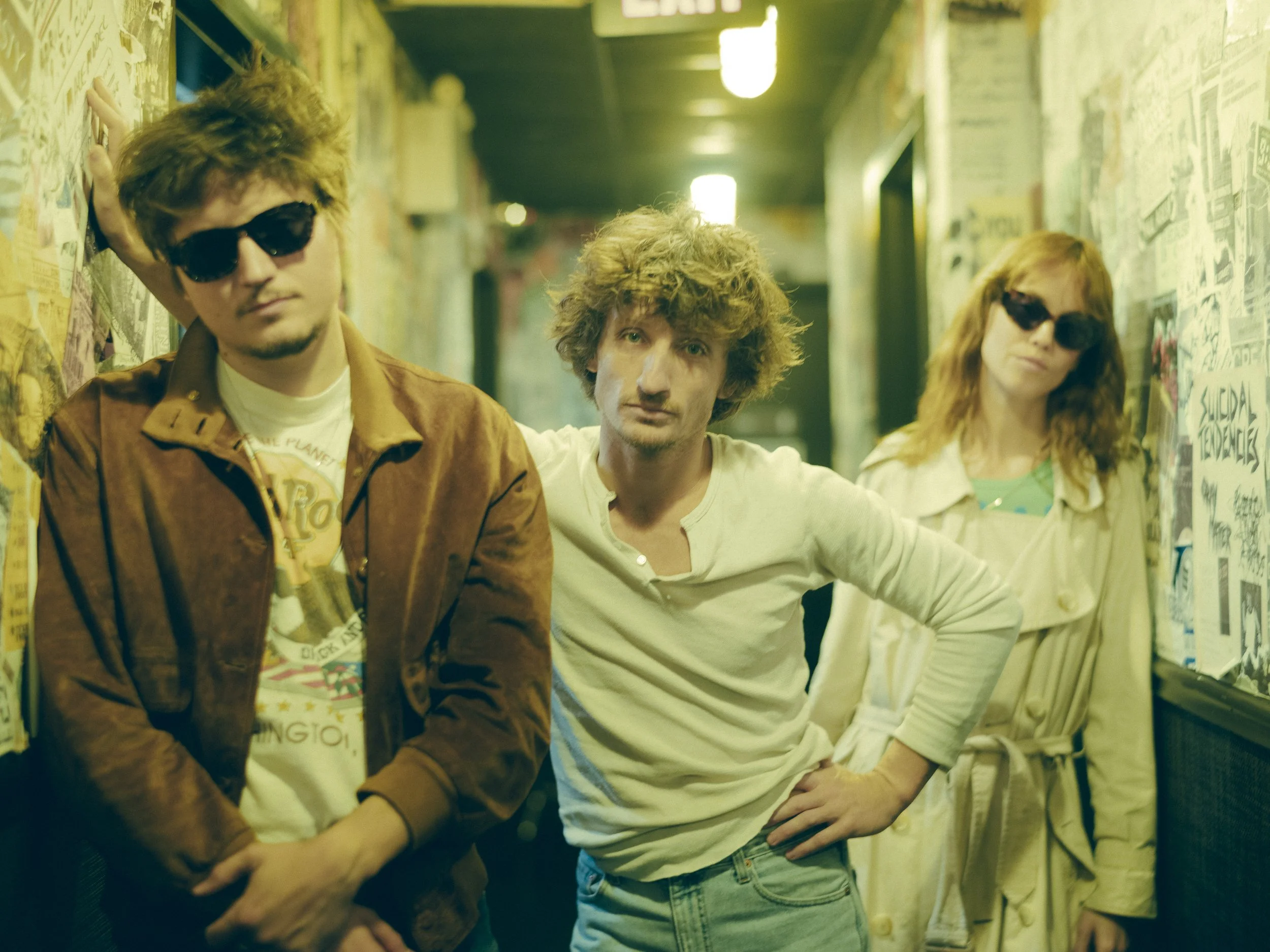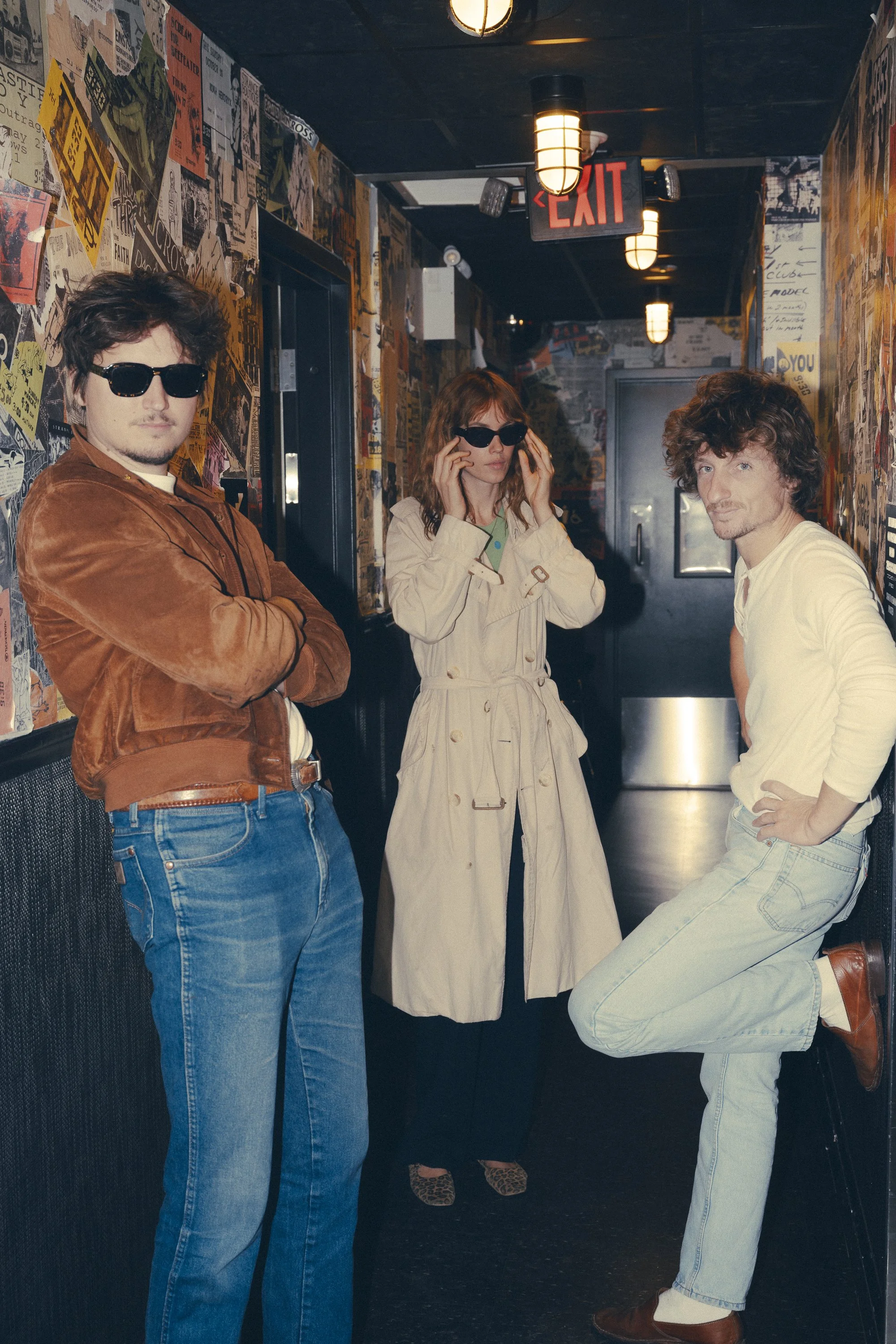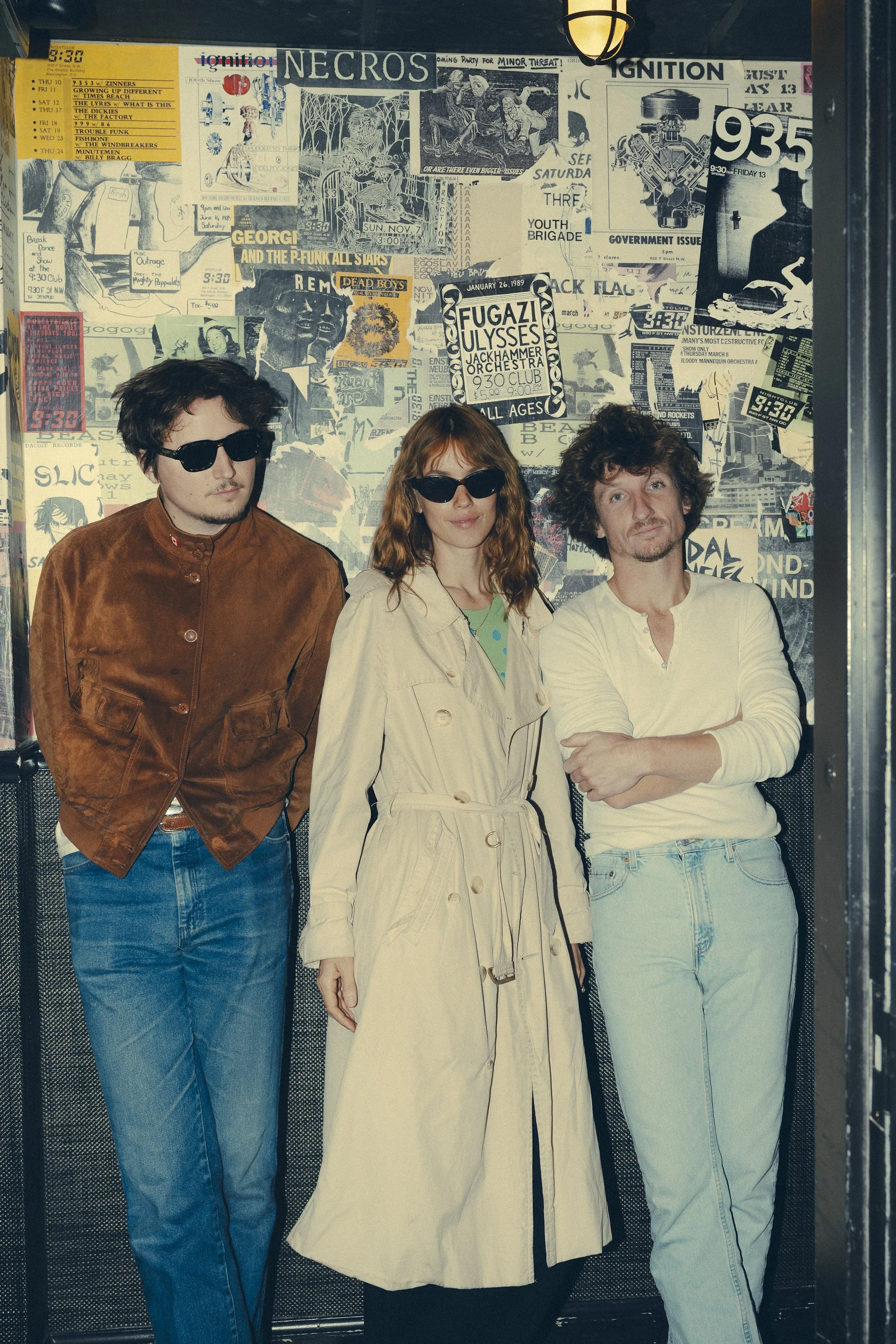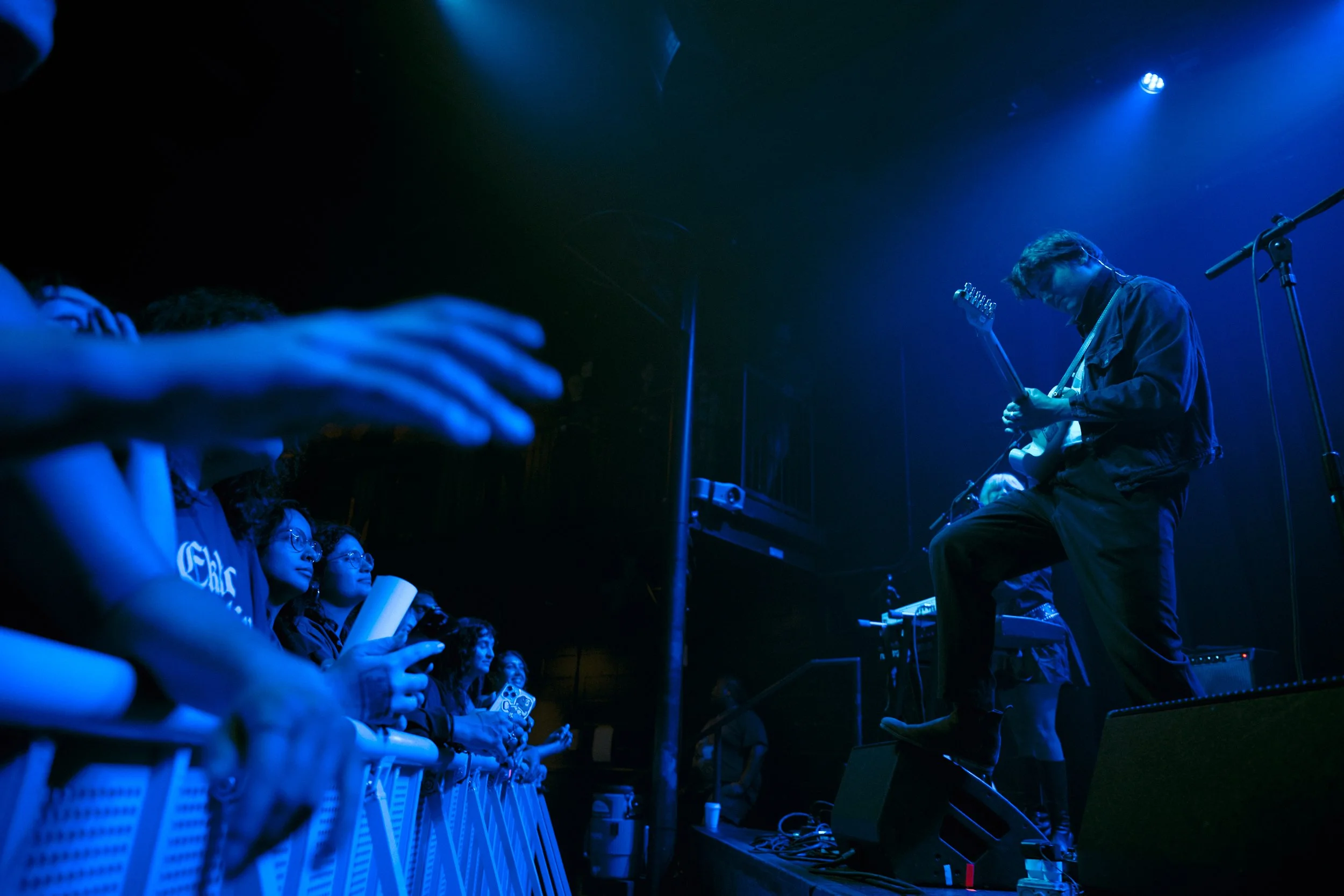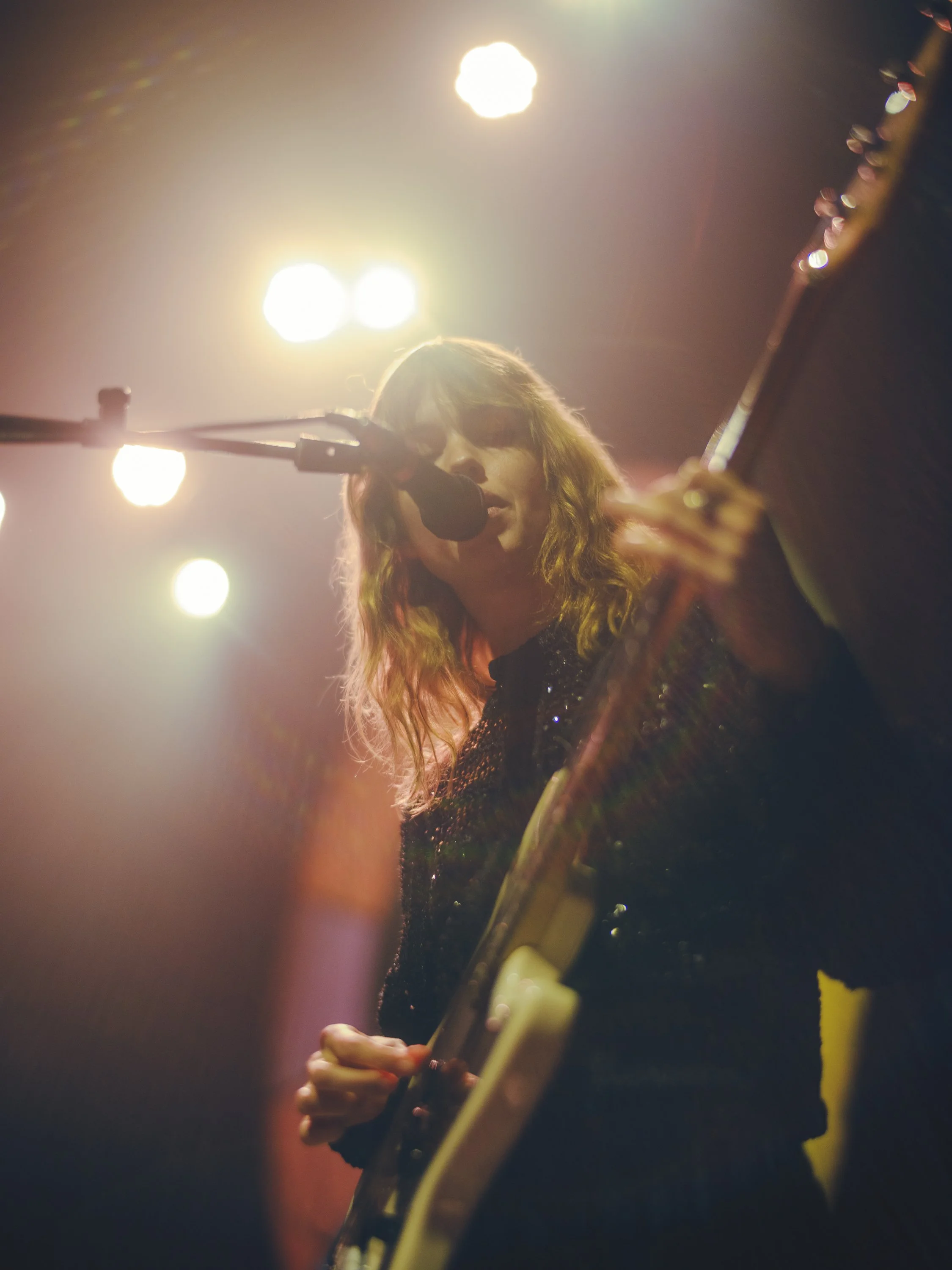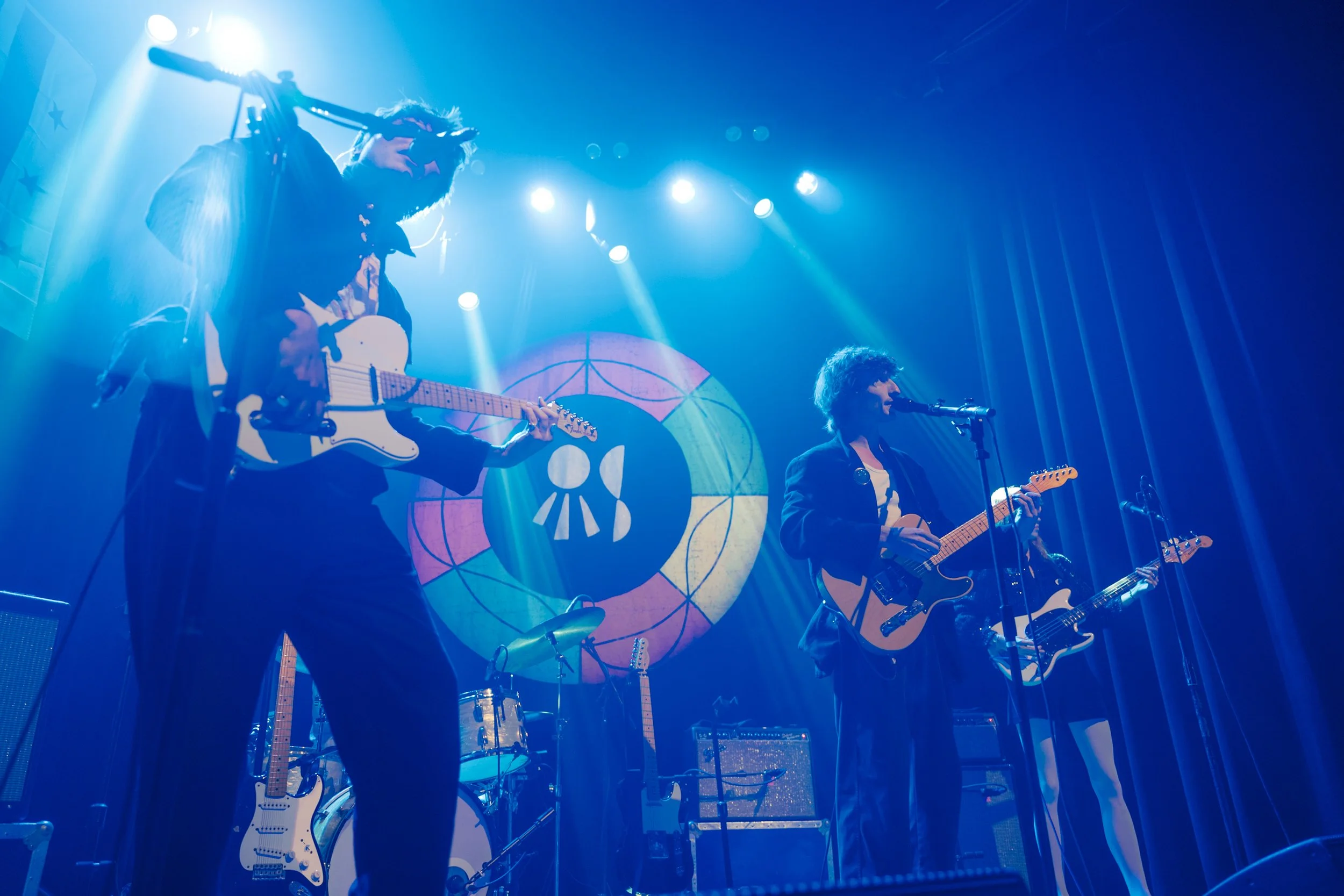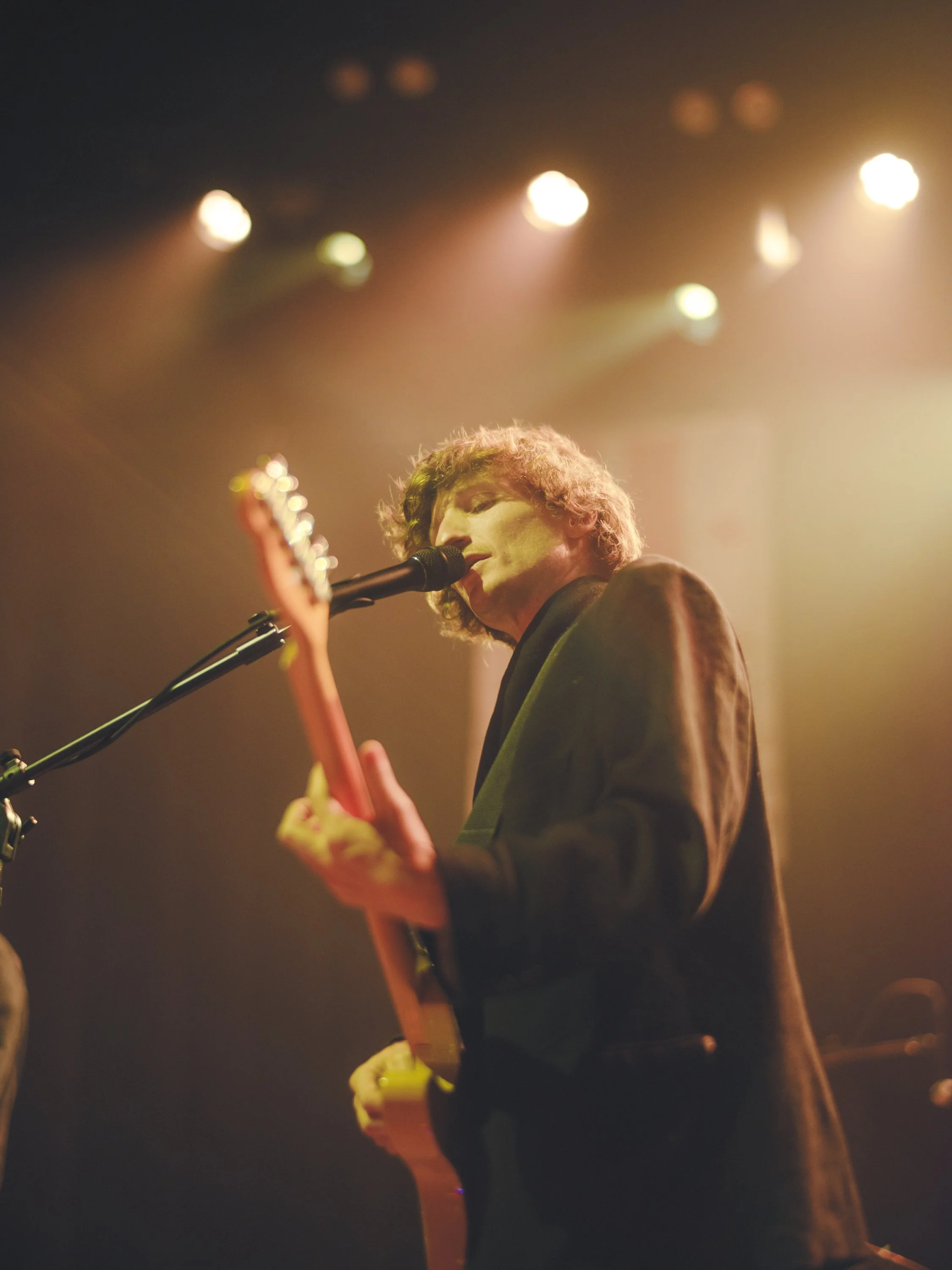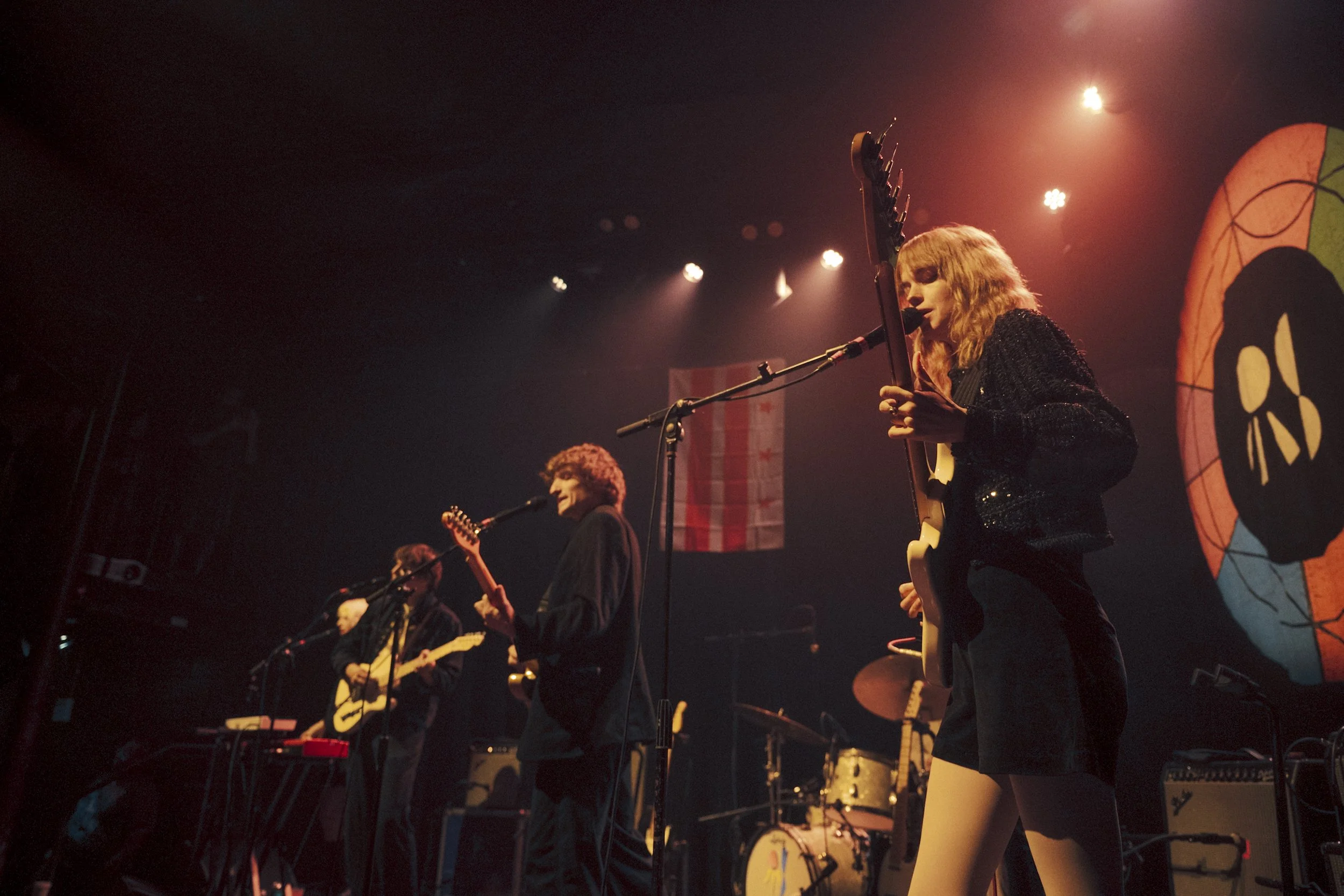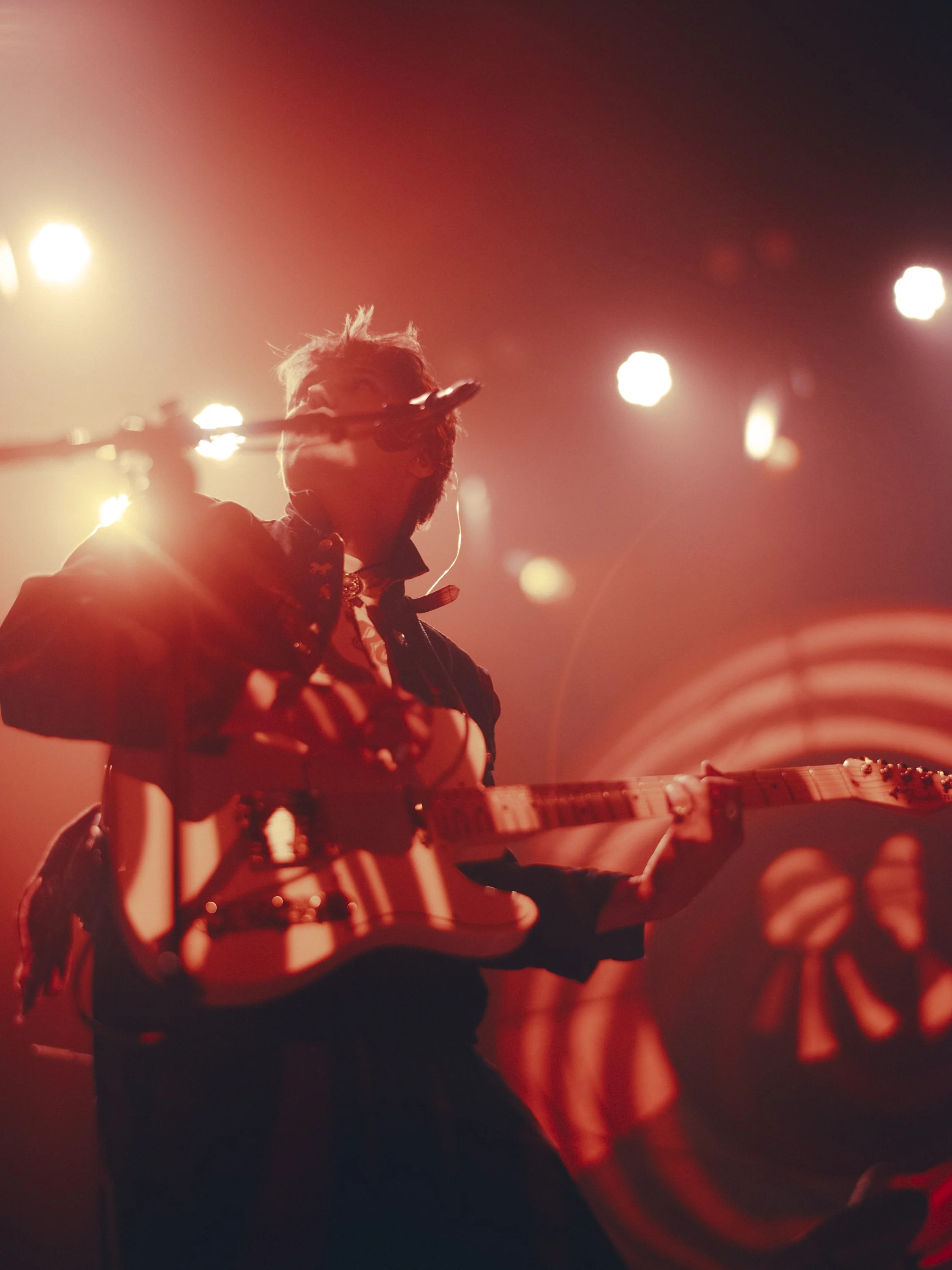On the Road and Into the Surreal With Oracle Sisters
Oracle Sisters at The Atlantis in Washington, D.C. Photo by Tom Rath.
In a no-more-than-six-by-four-foot dressing room adorned with funky blue wallpaper, the three members of Oracle Sisters sat squished together on a loveseat made to comfortably fit two bodies. Yet, it was the perfect setting for a band familiar with breaking convention and whose music feels like a hug from an old friend.
Hailing from Ireland, Finland and Denmark but calling Paris home base, multi-instrumentalists Christopher Willatt, Julia Johansen and Lewis Lazar started releasing music as a trio in 2019 and have since put out two albums, two EPs and a slew of singles. Their latest LP, Divinations, dropped in February and builds upon the meditative, dreamy nature of their discography while crafting a new world in the Oracle Sisters universe. Divinations sees the three-piece adopting a heavier sound at times to match the astute social commentary threaded throughout, while also allowing them to fashion fantastical fables from addictive melodies. Between their killer guitar solos, understated vocal harmonies and imaginative songwriting, Oracle Sisters have the makings of a timeless, once-in-a-generation band.
As their North American tour neared its end, I caught up with Chris, Julia and Lewis ahead of their show at The Atlantis in Washington, D.C to discuss the beauty of touring and the deeper themes of Divinations.
It’s been about two years since you guys last toured in North America. Besides new music, what are you doing differently this time around?
Chris: We have a tour manager, which is nice.
Julia: It’s amazing.
Chris: So we're not doing all the driving ourselves, which is super nice too. We kind of have a better organized team, I'd say, which takes a bit of pressure off, because touring is quite long, and it allows us just to put all our energy into the shows.
Lewis: Covering more ground as well. We’re playing more cities.
Julia: And I’m playing a new instrument.
Which is?
Julia: Bass.
Lewis: Yeah, Julia jumped from drums to bass. We also are playing slightly bigger venues as well on this tour, so that’s fun. And seeing a lot of the country stuff we haven't seen before, like the Southwest, Mid-America, Kansas, Nebraska.
I was actually gonna ask, Julia, is there a particular reasoning you’re not behind the drums this time around? What’s that been like?
Julia: We sort of thought that having us three up front would be maybe the visual and the identity for the live show. And I hopped on the drums for a couple of covers that we did on this tour, but yeah, we thought it worked pretty well.
Lewis: It was fun. I mean, everyone was saying that they missed Julia. She was behind the drums doing a great job but we just thought we’d try it, and we did a European tour where she played guitar, and she’s multi-talented.
Julia: Also, it’s more expensive to have six musicians on stage, so we decided to stick to five.
Lewis: On the European tour we had six on stage.
Chris: I think a big part of it too is that recording this album, you [Julia] were doing some bass on it as well and we were kind of mixing up the instruments a bit, so it seemed quite natural.
Photos by Tom Rath.
So before hunkering down in Northern France to formally put together Divinations, the beginning fragments of the album came from moments on the road, touring Hydranism. What’s it like to be back on tour, now presenting that final product at each show?
Julia: Exciting!
Chris: A lot of these songs were written in response to touring a lot in 2023, so these songs are really fun to play live. They have a bit more energy, we can blast them a bit more, they're a bit more frontal. And then I think any time you write music, it's kind of the full circle to actually go and play it for people and hear and feel their response back.
Julia: It reflects the dynamic and the speed of our crazy year of 2023 when we were all over the world.
Lewis: We played Japan, we played the U.S. three times, we did a European tour, so it was a really busy year touring. But this feels good. This year we've toured a lot but it feels less hectic since we have a bigger team. It's been more manageable. So it's been fun. I think it's been a more sustainable way to tour. The European tour was intense. This one feels more sustainable even though it's intense.
Julia: And we're happy to play faster songs on stage. I think that's something that was missing from our shows. Something more up tempo.
What’s your favorite song from Divinations to play live?
Julia: I like “Alouette” and “Velveteen.”
Lewis: Yeah, I like “Alouette” and “Marseille,” probably.
Chris: “Blue Left Hand” is fun.
So for the brief periods between shows you're not on the road driving, what's been your favorite part about traveling through the U.S. and Canada?
Lewis: For me, it's been the Southwest and Kansas and Nebraska and Northern Arizona and Southern Utah, that whole area.
Chris: Just that whole drive. We started in Joshua Tree, then we ended up in Flagstaff and then you're going to Utah, the Rocky Mountains. It covered a lot of different, rich landscapes and elevation. But then, what was weirdly incredible afterwards was getting into Kansas and Nebraska. Like, after so much stimulation through the window and so much to take in, it was this perfect, flat, open landscape with a huge blue sky. It was just perfect blue sky. That was really, really lovely afterwards.
And you guys stayed at Cornelia Murr’s house in Nebraska right?
Julia: Yes!
Chris: That was so fun. We went bowling at the local bowling alley and ate some great food.
Julia: Her house is so beautiful and cozy.
Lewis: She’s an old friend.
Photo by Tom Rath.
That’s awesome. So you’ve also been releasing tracks that didn’t quite make the album, “Hoagy’s Place” and, most recently, “Wait For Me.” Why did they ultimately not end up on Divinations and why did you choose to release them now?
Chris: I think there's always a balance when you're making a record that you’re finding. It’s just a feeling. You have a collection of songs that feel like they work really well together and if you throw certain ones in, it just doesn't feel quite right.
Lewis: It doesn’t tell the story that the album told. The overall atmosphere of the album was maybe a little bit more present and artistically darker, and those songs are quite solar and quite poppy. They were kind of fun to write, but didn't feel like they had the same weight, so we put them aside. But then we thought it would be a shame to leave them in the drawer anyway, so we're putting them out, and we're doing some more bonus tracks in the next month that are going to come out from the album sessions.
In terms of the album tracks, Divinations feels thematically very fantastical and untethered to reality, but at the same time, it has moments of social commentary, like on “Blue Left Hand” and “Velveteen.” Why was it important to have this dichotomy on the album?
Lewis: I don’t know if it was conscious, but it was definitely a response to touring and touring in the U.S. and the confrontation with reality a little bit here. I think the politics was changing at the time, so a lot of songs were inspired by the social realities that we're encountering, like the fentanyl crisis. Every time we pull into a venue downtown, it would be like zombie land. There's just this kind of atmosphere — the political atmosphere —brewing, and the whole social dynamic of the U.S. at that time, right before Trump got re-elected.
Julia: But then also ending up in Japan, which is such a poetic, dreamy place that we've never been to before.
Lewis: Yeah, it was a dreamy year with some real slaps in the face.
Chris: Yeah, the news was just very intense at the time we were writing the songs as well, so I think it was hard not to want to release some of that stuff that's brewing inside you in a very direct way. But at the same time, you want to be able to just elevate people in ways that aren't so literal. I think that blend was important. It felt like we wanted to get stuff out in a direct way. It felt important, and those songs were really the more direct ones.
There’s also a lot of natural and environmental imagery on the album. Where did that theme come from?
Chris: We all spend a lot of time in nature, like I live down in the Southwest of France, travel up to Paris a lot. They both stay outside in nature as well, and we tend to, when we can, get into nature as much as possible.
Lewis [mocklingly monotone]: “We stay outside in nature.” We live in a forest!
Chris: Yeah, they live in a forest, in fields, I live by the water, surrounded by trees. We like being in nature as much as possible, so I think it's always going to make its way into the songs. When we go to write, we're often trying to seclude ourselves a bit, but the whole album was recorded in Paris.
Lewis: It’s a more city album, but we live in nature.
Julia: But we also wrote a lot of the songs very secluded in this village, outside big cities, you know?
Lewis: If there’s imagery in there, it’s because we like trees.
Photos by Tom Rath.
I want to talk about “Moon On The Water,” specifically, because it’s one of my favorites on the record sonically, but I’ve never been able to wrap my head around the meaning of the chorus. Can you explain the process behind writing that one? Like, is there even a meaning?
Lewis: Yes! We wrote that song a long time ago. I used to do these word association lyrics. So like, the word “Hail Mary” would spurn an image in my head, like “wild honey pie.” But for some reason, the association only makes sense to me, so it would be an acausal association.
It's also supposed to show how when you're flipping through a magazine, there might be a lot of different articles or subjects in the magazine, and there's not necessarily a relationship between the articles or the titles. But, if you're reading them non-linearly, they all of a sudden start to complement each other and the meaning. By juxtaposing imagery, it creates a new meaning. So it's like a collage of images that sort of provoke a kind of tapestry of what's going on. So it’s like news flashes, you know what I mean? And it's also funny that people can read their own meaning into that too.
Chris: Compared to the verses, there’s so much space and the lyric is so direct and easy and simple. And then you could interpret it as scroll culture. You could interpret it as like someone who's going through a lot of sh*t. But it's just, the intention was to kind of…
Lewis: Juxtapose a very clear vision with a chaotic mismatch of imagery, which is kind of very modern, you know, that we're bombarded with multiple different narratives all at the same time. And it's supposed to sort of overlay them.
And there’s that extra beat before the chorus that makes it feel unsteady, which is kind of like that culture you were talking about.
Chris: Yeah, the whole thing is to kind of throw you in there.
Lewis: Yeah, I’m sorry we were playing that one in Europe but not in the U.S., unfortunately.
That’s okay! So what’s next for you guys after this tour wraps up?
Lewis: We’re going to the Blue Ridge Mountains to work on some new songs and we're writing our next album.
Anything you can tell us about that?
Lewis [sarcastically snarky]: It's going to be amazing.
I don’t know, I mean, we’re just trying to write the best songs we can write and we’ll see what comes out. We never know, but we have a lot of songs lying around. We’re going out fishing, you know?
All photos by Tom Rath (@tomrathphoto).

